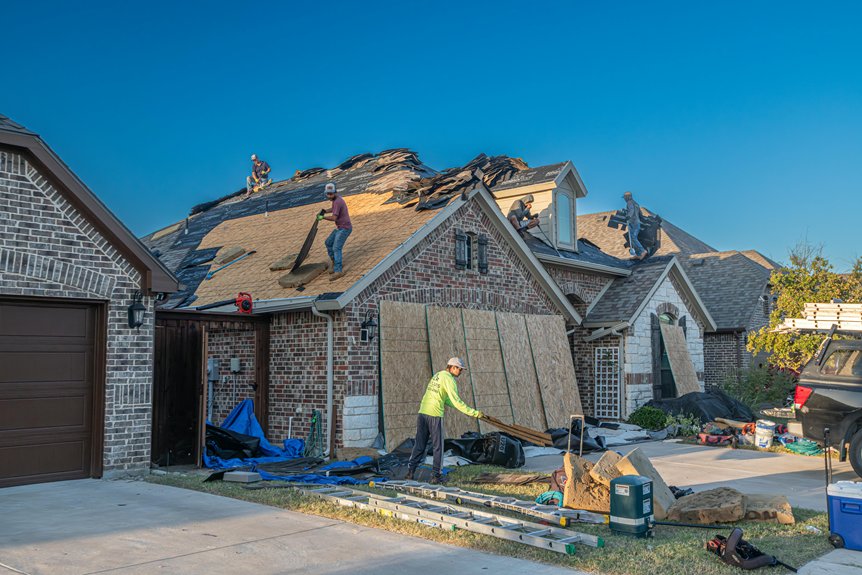If you’re considering a commercial roof replacement in Fort Worth, understanding the costs involved is essential for planning your budget. Factors like roof size, material choice, and building complexity can markedly impact overall expenses. Knowing what to expect helps you make informed decisions and avoid surprises down the line. To get a clear picture, you’ll want to explore the key elements that influence pricing and how they apply to your specific project.
Factors Influencing Commercial Roof Replacement Costs in Fort Worth
Several key factors influence the cost of replacing a commercial roof in Fort Worth. One of the first considerations is obtaining the necessary roofing permits, which can vary in cost and complexity depending on your project scope. These permits guarantee your roof replacement complies with local regulations, potentially affecting both timeline and expenses.
Additionally, the reputation of your chosen contractor plays a significant role; experienced, highly-rated contractors might charge more but often deliver better quality work, reducing future repair costs.
The size and complexity of your roof also impact the price, as larger or more intricate designs require more materials and labor. Being aware of these factors helps you better understand what influences your overall project costs and ensures you make informed decisions during your commercial roof replacement process.
Average Price Range for Different Roofing Materials
Choosing the right roofing material markedly impacts your overall replacement costs. Different materials vary in price, durability, and resistance to weather impact, which influences long-term expenses.
For example, asphalt shingles typically cost between $3.50 and $5.50 per square foot, offering a budget-friendly option with moderate durability. Metal roofing ranges from $7 to $12 per square foot, providing excellent weather resistance and longevity.
EPDM rubber roofing, common for flat roofs, averages $4 to $8 per square foot and excels in durability against harsh weather. TPO membranes fall around $5 to $8 per square foot, balancing cost and weather resilience.
Considering material durability and how it handles weather impact helps you choose a cost-effective roofing option suited to Fort Worth’s climate.
Cost Breakdown by Roof Size and Building Type
The cost to replace a roof in Fort Worth varies considerably based on the roof’s size and the type of building it covers. Larger roofs require more materials and labor, increasing overall costs.
For small commercial buildings, expect lower expenses, especially if roof maintenance has been kept up, which can extend its lifespan and reduce replacement costs.
Larger facilities, like warehouses or factories, demand more extensive work, raising your expenses. Building type also influences costs; flat roofs often need different materials and techniques compared to pitched roofs.
Additionally, local building codes require roofing permits, which add to the overall expense.
Keep in mind that proper planning and understanding these factors can help you budget effectively for your commercial roof replacement in Fort Worth.
Additional Expenses to Consider During Replacement
When planning for your commercial roof replacement in Fort Worth, it’s important to account for additional expenses beyond the basic labor and materials, as these can considerably impact your overall budget. Permits and inspections are necessary to guarantee your project complies with local codes, which may involve fees and time delays. Additionally, coordinating with a professional roofing company like Top View Roofing can help streamline the process and ensure compliance with local regulations. You should also prepare for potential tenant disruptions, especially if your building remains operational during the replacement. These disruptions can lead to additional costs, such as temporary relocation or adjusted work hours, to minimize inconvenience.
Budgeting for these extras helps prevent surprises and keeps your project on track. Recognizing and planning for permits, inspections, and tenant disruptions ensures a smoother process and better control over your overall commercial roof replacement expenses.
How Roof Complexity Affects Overall Expenses
Roof complexity plays a significant role in determining your overall replacement costs because intricate designs, multiple levels, or unusual shapes require more time, specialized equipment, and labor.
The roof shape influences how challenging it’s to install or replace, with complex shapes like domes or multiple slopes increasing labor hours.
Material thickness also impacts costs; thicker materials may need specialized handling and installation techniques, raising overall expenses.
A simple flat roof will generally cost less than a complex, multi-faceted structure.
The more complex your roof’s design, the more you’ll pay in labor, materials, and equipment.
Understanding how these factors influence the project helps you better anticipate your budget and avoid surprises during the replacement process.
Cost Comparison: New Installation vs. Roof Repairs
Choosing between a new roof installation and repairs depends largely on your roof’s condition and long-term goals. A thorough roof inspection helps determine whether repairs will suffice or if a full replacement is necessary.
Repairs typically cost less upfront and may extend your roof’s life, but they mightn’t address underlying issues.
On the other hand, a new installation involves higher initial costs but offers the benefit of modern materials and updated warranty coverage, which can provide peace of mind.
If your roof has extensive damage or is nearing the end of its lifespan, a new installation might be more cost-effective in the long run.
Evaluating the condition through an inspection and considering warranty options will help you make an informed decision.
Tips for Budgeting and Finding the Best Value
To get the best value for your commercial roof replacement, start by setting a clear budget based on your long-term needs and financial situation.
Consider insurance considerations carefully; verify what your policy covers to avoid unexpected expenses.
When selecting a contractor, prioritize experience, reputation, and transparency to ensure quality work within your budget.
Obtain multiple quotes to compare costs, but don’t choose solely on price—look for value, including warranties and materials used.
Budget wisely by including potential hidden costs, such as permits or additional repairs.
Remember, a higher upfront investment in quality materials and reputable contractors can save you money long-term by reducing future repairs.
Proper planning helps you balance affordability with durability, ensuring your investment delivers lasting value.
Conclusion
Understanding the factors that influence your commercial roof replacement costs helps you make informed decisions. By considering roof size, material, complexity, and additional expenses, you can budget more accurately and choose the best value for your project. Planning ahead and working with reputable contractors guarantees your replacement stays within budget and meets your needs. For more information on how to schedule your free roof inspection, call us at (405) 543-2920 or visit us online at Top View Roofing. With the right approach, you’ll protect your building and investment while avoiding unexpected costs down the line.


















